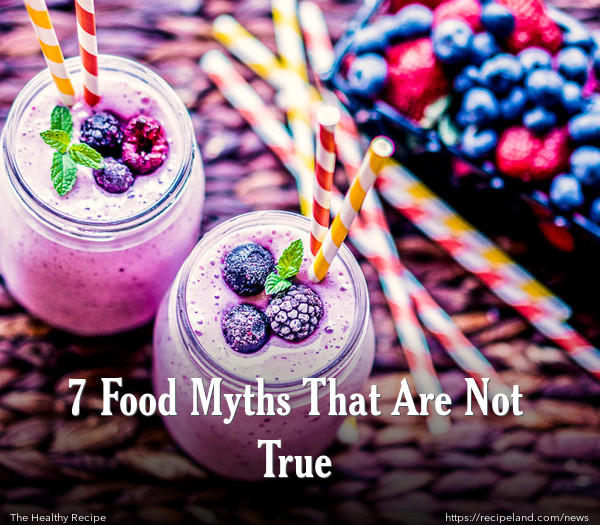There is so much information about what to eat and what to avoid, and it can be hard to decide what to believe.
Here are 7 food myths, explained further by nutritionists and dieticians, that you need to know more about to follow a healthy diet.
1. You should never eat at night.
Eating before you go to bed is not what causes you to gain weight. Ilyse Schapiro, RD, author of Should I Scoop Out My Bagel?, states, “It all comes down to simple mathematics. If your body’s used more energy than it’s stored that day, a snack before bed is not a bad thing at all and can even help stabilize your blood sugar levels.”
When you decide you are forbidden to eat after a certain hour, you will experience feelings of deprivation, and be more likely to reach for unhealthy snacks. Cutting down on snacking immediately before you lay down at night may help prevent you from developing acid reflux, and may help you sleep better, because your body is not trying to rest and digest food at the same time.
2. You should always eat gluten-free foods.
Unless you have a gluten sensitivity or have celiac disease, you do not necessarily have to go gluten-free. Isabel Smith, RD, a New York City based celebrity dietician and fitness expert explains, “One of the biggest issues I’ve seen in recent years is people trading in cookies and pasta for gluten-free options, thinking they’re doing themselves a huge favour. In many cases, gluten free products contain way more garbage than the gluten-containing ones do.”
Gluten-free products also tend to be more expensive, so you might be spending more than you need to at the grocery store. Elizabeth Shaw, RDN, a dietician in the San Diego area, states, “Gluten-free products are often much more expensive and usually also higher in calories, sugar, and fat.”
She recommends opting for whole grain healthy choices, like quinoa, amaranth, brown rice, barley, and bulgur, because, “they contain a plethora of minerals and nutrients like iron, zinc, and calcium, and are minimally processed.”
3. You should avoid all carbs.
Your body requires carbohydrates for energy, and this is particularly important for those who enjoy an active lifestyle.
Smith states, “Our muscles and tissues need carbs for muscle building, weight loss, and daily functioning. Certain carb-free diets boast quick weight loss, but this often means water weight loss and you are not really burning fat. Keep in mind that moderation is key when it comes to carbs, though. You should reach around the crackers, breads, and pastas, and choose the nutrient-rich carbohydrates like quinoa, wheat berries, sprouted grains, sweet potatoes, yams, and butternut squash. Smith states, “These foods ensure that you’re getting your daily fill of nutrients along with a boost in energy.”
4. You should avoid frozen vegetables.
There is a huge myth surrounding frozen vegetables, suggesting that they are less healthy than the fresh versions. The truth is, frozen vegetables may actually provide more nutrients than the fresh varieties.
Smith states, “Frozen vegetables tend to be richer in nutrients because they’re more likely to be picked at the height of ripeness, whereas fresh veggies are picked before ripeness and then sent to the grocery store to further ripen before being purchased.” Be sure to select the frozen vegetables that do not contain added ingredients like butter, salt, and artificial flavourings.
5. You should always drink fruit smoothies.
Unfortunately, most pre-packaged fruit smoothies contain large amounts of sugar. Schapiro states, “People love smoothies because you can cram so many ingredients and drink it all down in one sitting.
But the problem is that those ingredients add up. Before you know it, what you thought was a nutrient-packed meal or snack now has as much calories as a burger—and a whole lot more sugar.” For a sweet treat, reach for whole fruit instead. It will fill you up, cost less, and be a healthier choice.
6. When you eat fat, you get fat.
Your body requires plenty of healthy fats, like the kinds that can be found in avocados, nuts, certain oils, and fatty fish. Shaw explains, “Some balk when they read the nutrition labels for certain foods high in natural fat, like nuts, for example. But they’re a great source of protein and fibre and will keep your hunger at bay for much longer periods of time than chips or crackers, which may be lower in calories.”
It’s usually best to avoid foods that claim to be “fat-free” because they typically contain a lot of artificial ingredients to help make up for the flavour and texture provided by the healthy fats. Make natural choices whenever possible, like using lemon juice and olive oil for salad dressing, instead of processed dressings.
7. You should only drink skim milk.
Don’t worry too much if you actually prefer whole milk to skim milk. According to Clark, this is not terrible for you. Clark states, “In fact, the fat in whole milk may even promote fullness and serve as a better vehicle for fat-soluble vitamins such as vitamins A and D, compared with low-fat and fat-free dairy products.” Just be sure to enjoy whole milk in moderation.
Following a healthy lifestyle includes knowing the facts about the foods you are eating, and knowing which myths to believe. These tips can help to point you in the right direction.










Comments